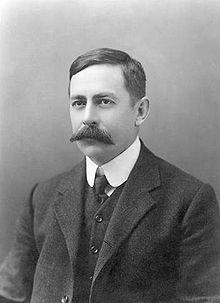Littleton Groom
Sir Littleton Ernest Groom (born April 22, 1867 in Toowoomba , Queensland , † November 6, 1936 in Canberra ) was an Australian politician and, among other things, foreign minister of the country.
Early life
Groom was born in Toowoomba , Queensland and attended Toowoomba Grammar School , where he was the captain of his school's soccer and cricket teams, and Ormond College, Melbourne University , where he received a law scholarship. He then worked as a lawyer and active judge. In July 1894 he married Jessie Bells.
Political career
Groom was an Australian nationalist who advocated expanding the Commonwealth's power and industrial strength. In 1904 he supported the government of Chris Watson . During Deakin's second term , he was Home Secretary from July 1905 to October 1906 . In October 1906 he became Attorney General of Australia. He held this office until Deakin's failed third term in November 1908. He succeeded in introducing laws to care for the invalids and the elderly in the Commonwealth.
With the beginning of the fourth term of office of Deakin in June 1909 Groom got the post of foreign minister , which he held until the election defeat in 1910. After 1910 he became a stubborn opponent of the Labor Party and criticized, among other things, their government-owned Commonwealth Bank of Australia and their attempt to establish a monopoly. In the Joseph Cook government from June 1913 to September 1914 he was Minister for Trade and Consumption.
Nationalist government
Groom was Vice President of the Executive Council from November 1917 to March 1918 during Hughes' fourth term and Minister of Labor and Railroad from March 1918 to December 1921. Among other things, he decided to expand the railway and was involved in the decision to move the seat of government to Canberra . In December 1921 he was again attorney general. He was also Minister of Commerce and Consumption, and Minister of Health of Australia in May and June 1924 due to Austin Chapman's poor health. He led the Australian delegation to the fifth meeting of the League of Nations in Geneva in 1924. After a miserably failed attempt to have “foreign” workers deported and after several political misconduct, he had to resign in December 1925.
speaker
After his resignation, he was Speaker of the House of Representatives from January 1926 to 1929. During that time he oversaw the government's move from Melbourne to Canberra . However, because he wanted to continue to hold on to the Commonwealth and Australia's dependence on the motherland, the government of Stanley Bruce failed in 1929 . The dissatisfied Nationalist Party of Australia successfully put up a candidate against Groom. This made Groom the first speaker to lose his seat in an election.
Groom returned to his Brisbane law firm . In the 1931 election he was re-elected as an Independent and joined the United Australia Party in August 1933. From 1932 to 1936 he was manager of the Bankruptcy Law Committee. He died of cerebrovascular disease in Canberra. He left behind his wife and one of their two daughters.
Groom co- authored the Judicial Power of the Commonwealth with Sir John Quick in 1904 and co-authored numerous publications in Queensland . As a member of the Anglican Church, Groom was honored with the Order of St. Michael and St. George . He was knighted in January 1924 for his services in politics. In 1984 a constituency was named after him, like Groom Park in his hometown Toowoomba .
Groom's older brother, Henry Littleton Groom, was a long-time member of the Queensland Legislative Council .
Individual evidence
- ↑ a b c d e f Percival Serle: Groom, Sir Littleton Ernest (1867–1936). In: Dictionary of Australian Biography. Project Gutenberg Australia, accessed November 24, 2007 .
- ↑ a b c d e f g David Carment: Groom, Sir Littleton Ernest (1867–1936) . In: Douglas Pike (Ed.): Australian Dictionary of Biography . Melbourne University Press, Carlton (Victoria) 1966–2012 (English).
| personal data | |
|---|---|
| SURNAME | Groom, Littleton |
| ALTERNATIVE NAMES | Groom, Littleton Ernest (full name) |
| BRIEF DESCRIPTION | Australian politician and foreign minister |
| DATE OF BIRTH | April 22, 1867 |
| PLACE OF BIRTH | Toowoomba , Queensland |
| DATE OF DEATH | November 6, 1936 |
| Place of death | Canberra |

